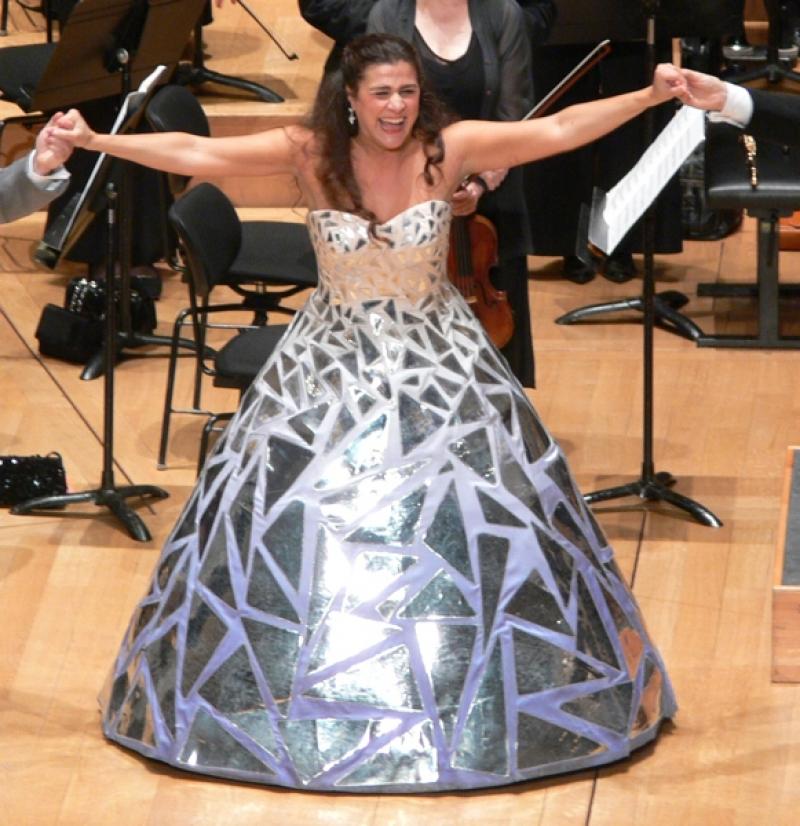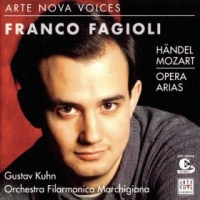Cecilia Bartoli Sings Handel, Barbican Hall | reviews, news & interviews
Cecilia Bartoli Sings Handel, Barbican Hall
Cecilia Bartoli Sings Handel, Barbican Hall
The mistress of vocal seduction enchants in all the arts of singing

Cecilia Bartoli invites you to her party, she stands on stage beaming and welcoming you as her guest, about to serve up a banquet of song. This is what last night’s concert felt like in the glowing warmth of this remarkable Italian mezzo-soprano’s company, singing one of her favourite composers, Handel, ranging from the sunlit laughter that seems embedded in her voice to some of the most tragically moving singing I’ve heard.
The picture above gives an idea of the extravagantly opulent figure she likes to cut on stage - the generosity of her figure and smiles, the flamboyance of her dressing-up, the sense of triumphal theatrical occasion she brings. She’s just been singing her programme of male castrati, Sacrificium, in Manchester, Dublin and Birmingham - last night in London she appeared to want to be a girl again.
The dresses were more seductive, more boudoir than the one shown; one black and figure-hugging in taffeta, accessorised with trophy diamonds, a tiara holding back her mass of black curls, and a perfectly extraordinary pair of shoes - five-inch heels perhaps, each stiletto with a ring in it. The other, which occasioned a mass sigh of desire through the auditorium as she trotted on for the second half, was a fine black lace corset over an ivory satin skirt. With Bartoli it’s not vulgar to describe the impact she makes in what she wears, it’s obligatory. It’s part of her singing persona that she loves to add visual complement to the musical package, to tease, prick, go over the top, entertain in all the ways that divas do.
She can, because by gum she’s a mistress of vocal seduction too. Underneath that dazzling effulgence and apparently fearless risk-taking in speed, dynamic, tonal colour, there is a superbly controlling mind, determined to stir all the arts of singing into her cauldron. With a mostly Handel programme, accompanied by the lilting and springy Basel Kammerorchester, this was a night for myth-sized emotions, for raging sorceresses Armida, Melissa and Alcina, all finding their spells inadequate to trapping a man’s heart, for Cleopatra kittenishly swooping upon Caesar, for Agilea hopelessly in love with Theseus. With Handel, unlike Purcell, “first came the music, then the word”, and these operas were written to dazzle with the amplitude of vocal brilliance of which over a 20-year career Bartoli, now 44, has become a peerless executant. One might call it extreme singing. Yet she also finds genuine psychological depth in Handel’s female characters - vastly feistier than Verdi or Donizetti women, heaving with reckless thoughts and flawed hopes.
Alcina’s “Ah! mio cor” was typical of the enormous range of contrasts she zaps out, from the stillest, most submissive misery to paroxysms of amorous rage so fierce that every note of her chest voice rasped. Mortified fury cascaded through her voice, she shook it, rather than trilling, a terrifying sound, and at the other extreme produced so soft and fine a thread of pianissimo note that it chilled. Though it’s disconcerting to see a face contorting so vividly as she sings, that Alcina was astounding.
Yet if no one can rage as furiously as Bartoli storms up and down scales and arpeggios from alto to high soprano, so no one laughs and bubbles quite as sexily she does. In the Teseo aria, “Ah, che sol”, the rapidity, liquidity and sheer complicatedness of her coloratura in an almost insane competition with an oboist made one just smile with joy. In Cleopatra’s “V’adoro pupille” her voice was silkiest mink seduction, in “Che sento?... Se pietà” utmost tragedy, almost Wagnerian in emotional reach, and in “Da tempeste” of such phenomenal dexterity and merriment that I found tears in my eyes. For some people she's just too manipulative, but to me Bartoli shows as few people do that singing is above all a fount of joy in life, and if you have a voice, you seize it with all your might and shake all the fruits out of it.
She’s at her greatest on record or in the small venue where she doesn’t try to force her effects - a few years back I heard her sink in a garble of squawls and distorted details in the far-too-large Festival Hall - and the Barbican Hall is perfect for her. It also gave a winning resonance to the small Basel Kammerorchestra, directed by the lead violin, Julia Schröder, all of them lilting and bopping in their seats as they played, barely sitting at all. Their expert rapport with Bartoli, whose back was turned to them, was evident in the impression of almost instinctive unanimity out of which they confidently present fine soloists. Handel often pitted the voice against a similarly ranged instrument, testing each out on the other, and there was an exultant example here in a three-way virtuoso challenge between oboist Kerstin Kramp, trumpeter Simon Lilly and Bartoli in the Amadigi aria.
 Bartoli is touring this programme with a rising Argentinian countertenor, 29-year-old Franco Fagioli, who joined her in part two in a selection from Giulio Cesare. He doesn’t for a moment suggest a warrior, being rather spindly, seeming older than his age last night in goatee beard and with receding hair (like John Cazale in The Godfather), but his voice has rich alto tone and an exceptional range into high soprano, while his musicality has plenty of independent life, which makes it clear why Bartoli performs with him. In Caesar’s “Al lampo dell’armi” he unleashed a wow top register, matched by some full baritonal notes two-and-a-half octaves below. He seemed to have picked up a couple of Bartoli’s bartolisms, the trick of spinning a tense note out through gritted teeth or trying to squeeze just a little too much emotion out of a note, sacrificing its tone. Fagioli’s voice isn’t yet quite various or malleable enough to do it, but certainly the two singers make an uncannily sympathetic mezzo duo.
Bartoli is touring this programme with a rising Argentinian countertenor, 29-year-old Franco Fagioli, who joined her in part two in a selection from Giulio Cesare. He doesn’t for a moment suggest a warrior, being rather spindly, seeming older than his age last night in goatee beard and with receding hair (like John Cazale in The Godfather), but his voice has rich alto tone and an exceptional range into high soprano, while his musicality has plenty of independent life, which makes it clear why Bartoli performs with him. In Caesar’s “Al lampo dell’armi” he unleashed a wow top register, matched by some full baritonal notes two-and-a-half octaves below. He seemed to have picked up a couple of Bartoli’s bartolisms, the trick of spinning a tense note out through gritted teeth or trying to squeeze just a little too much emotion out of a note, sacrificing its tone. Fagioli’s voice isn’t yet quite various or malleable enough to do it, but certainly the two singers make an uncannily sympathetic mezzo duo.
Listen to Bartoli sing Handel's "Lascia la spina, cogli la rosa" (Leave the thorn, pluck the rose, or you're looking to get hurt) with Marc Minkowski conducting Les Musiciens du Louvre:
Share this article
Add comment
The future of Arts Journalism
You can stop theartsdesk.com closing!
We urgently need financing to survive. Our fundraising drive has thus far raised £49,000 but we need to reach £100,000 or we will be forced to close. Please contribute here: https://gofund.me/c3f6033d
And if you can forward this information to anyone who might assist, we’d be grateful.

Subscribe to theartsdesk.com
Thank you for continuing to read our work on theartsdesk.com. For unlimited access to every article in its entirety, including our archive of more than 15,000 pieces, we're asking for £5 per month or £40 per year. We feel it's a very good deal, and hope you do too.
To take a subscription now simply click here.
And if you're looking for that extra gift for a friend or family member, why not treat them to a theartsdesk.com gift subscription?
more Classical music
 From Historical to Hip-Hop, Classically Black Music Festival, Kings Place review - a cluster of impressive stars for the future
From quasi-Mozartian elegance to the gritty humour of a kitchen inspection
From Historical to Hip-Hop, Classically Black Music Festival, Kings Place review - a cluster of impressive stars for the future
From quasi-Mozartian elegance to the gritty humour of a kitchen inspection
 Shibe, LSO, Adès, Barbican review - gaudy and glorious new music alongside serene Sibelius
Adès’s passion makes persuasive case for the music he loves, both new and old
Shibe, LSO, Adès, Barbican review - gaudy and glorious new music alongside serene Sibelius
Adès’s passion makes persuasive case for the music he loves, both new and old
 Anja Mittermüller, Richard Fu, Wigmore Hall review - a glorious hall debut
The Austrian mezzo shines - at the age of 22
Anja Mittermüller, Richard Fu, Wigmore Hall review - a glorious hall debut
The Austrian mezzo shines - at the age of 22
 First Person: clarinettist Oliver Pashley on the new horizons of The Hermes Experiment's latest album
Compositions by members of this unusual quartet feature for the first time
First Person: clarinettist Oliver Pashley on the new horizons of The Hermes Experiment's latest album
Compositions by members of this unusual quartet feature for the first time
 Gesualdo Passione, Les Arts Florissants, Amala Dior Company, Barbican review - inspired collaboration excavates the music's humanity
At times it was like watching an anarchic religious procession
Gesualdo Passione, Les Arts Florissants, Amala Dior Company, Barbican review - inspired collaboration excavates the music's humanity
At times it was like watching an anarchic religious procession
 Classical CDs: Camels, concrete and cabaret
An influential American composer's 90th birthday box, plus British piano concertos and a father-and-son duo
Classical CDs: Camels, concrete and cabaret
An influential American composer's 90th birthday box, plus British piano concertos and a father-and-son duo
 Cockerham, Manchester Camerata, Sheen, Martin Harris Centre, Manchester review - re-enacting the dawn of modernism
Two UK premieres added to three miniatures from a seminal event of January 1914
Cockerham, Manchester Camerata, Sheen, Martin Harris Centre, Manchester review - re-enacting the dawn of modernism
Two UK premieres added to three miniatures from a seminal event of January 1914
 Kempf, Brno Philharmonic, Davies, Bridgewater Hall, Manchester review - European tradition meets American jazz
Bouncing Czechs enjoy their Gershwin and Brubeck alongside Janáček and Dvořák
Kempf, Brno Philharmonic, Davies, Bridgewater Hall, Manchester review - European tradition meets American jazz
Bouncing Czechs enjoy their Gershwin and Brubeck alongside Janáček and Dvořák
 Solomon, OAE, Butt, QEH review - daft Biblical whitewashing with great choruses
Even a top soprano and mezzo can’t make this Handel paean wholly convincing
Solomon, OAE, Butt, QEH review - daft Biblical whitewashing with great choruses
Even a top soprano and mezzo can’t make this Handel paean wholly convincing
 Two-Piano Gala, Kings Place review - shining constellations
London Piano Festival curators and illustrious friends entertain and enlighten
Two-Piano Gala, Kings Place review - shining constellations
London Piano Festival curators and illustrious friends entertain and enlighten
 Echo Vocal Ensemble, Latto, Union Chapel review - eclectic choral programme garlanded with dance
Beautiful singing at the heart of an imaginative and stylistically varied concert
Echo Vocal Ensemble, Latto, Union Chapel review - eclectic choral programme garlanded with dance
Beautiful singing at the heart of an imaginative and stylistically varied concert
 Scott, Irish Baroque Orchestra, Whelan, RIAM, Dublin review - towards a Mozart masterpiece
Characteristic joy and enlightenment from this team, but a valveless horn brings problems
Scott, Irish Baroque Orchestra, Whelan, RIAM, Dublin review - towards a Mozart masterpiece
Characteristic joy and enlightenment from this team, but a valveless horn brings problems

Comments
Very well written. I first